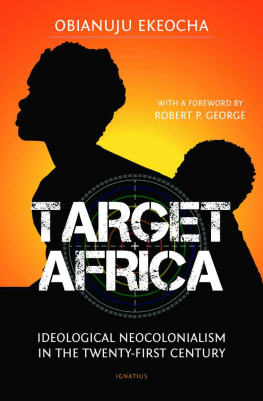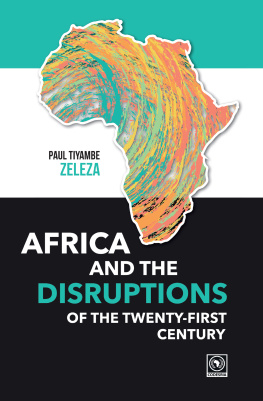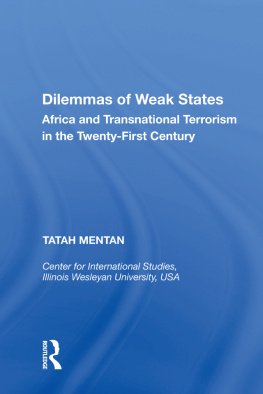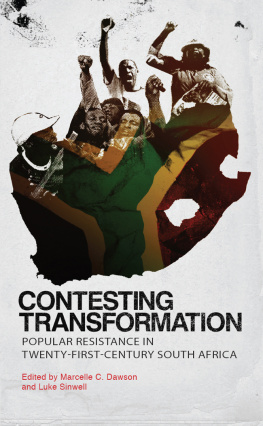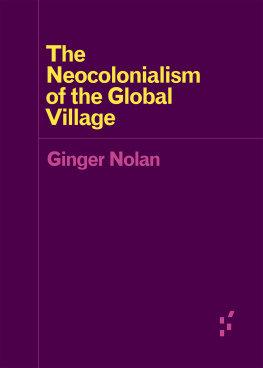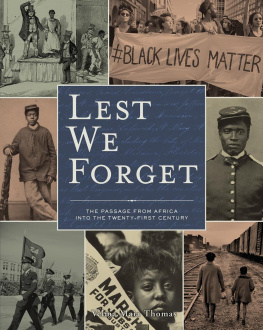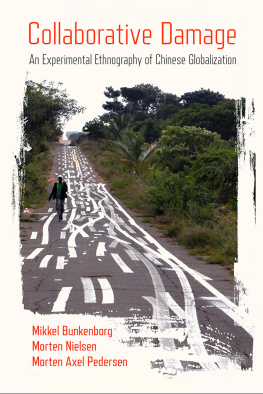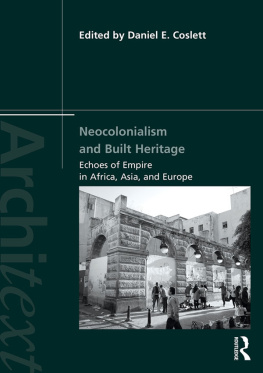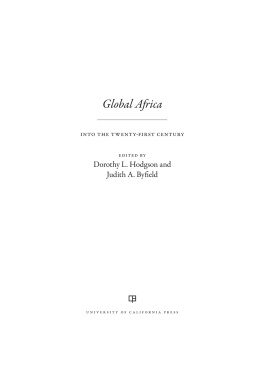Obianuju Ekeocha - Target Africa: Ideological Neocolonialism in the Twenty-First Century
Here you can read online Obianuju Ekeocha - Target Africa: Ideological Neocolonialism in the Twenty-First Century full text of the book (entire story) in english for free. Download pdf and epub, get meaning, cover and reviews about this ebook. City: San Francisco, year: 2018, publisher: Ignatius Press, genre: Science / Politics. Description of the work, (preface) as well as reviews are available. Best literature library LitArk.com created for fans of good reading and offers a wide selection of genres:
Romance novel
Science fiction
Adventure
Detective
Science
History
Home and family
Prose
Art
Politics
Computer
Non-fiction
Religion
Business
Children
Humor
Choose a favorite category and find really read worthwhile books. Enjoy immersion in the world of imagination, feel the emotions of the characters or learn something new for yourself, make an fascinating discovery.
- Book:Target Africa: Ideological Neocolonialism in the Twenty-First Century
- Author:
- Publisher:Ignatius Press
- Genre:
- Year:2018
- City:San Francisco
- Rating:5 / 5
- Favourites:Add to favourites
- Your mark:
- 100
- 1
- 2
- 3
- 4
- 5
Target Africa: Ideological Neocolonialism in the Twenty-First Century: summary, description and annotation
We offer to read an annotation, description, summary or preface (depends on what the author of the book "Target Africa: Ideological Neocolonialism in the Twenty-First Century" wrote himself). If you haven't found the necessary information about the book — write in the comments, we will try to find it.
Obianuju Ekeocha: author's other books
Who wrote Target Africa: Ideological Neocolonialism in the Twenty-First Century? Find out the surname, the name of the author of the book and a list of all author's works by series.
Target Africa: Ideological Neocolonialism in the Twenty-First Century — read online for free the complete book (whole text) full work
Below is the text of the book, divided by pages. System saving the place of the last page read, allows you to conveniently read the book "Target Africa: Ideological Neocolonialism in the Twenty-First Century" online for free, without having to search again every time where you left off. Put a bookmark, and you can go to the page where you finished reading at any time.
Font size:
Interval:
Bookmark:
TARGET AFRICA
Obianuju Ekeocha
the Twenty-First Century
With a Foreword by Robert P. George
IGNATIUS PRESS SAN FRANCISCO
Cover art and design by Enrique J. Aguilar Pinto
2018 by Ignatius Press, San Francisco
All rights reserved
ISBN 978-1-62164-215-2 (PB)
ISBN 978-1-64229-530-6 (EB)
Library of Congress Control Number 2017955106
Printed in the United States of America
To my beloved parents,
Christopher and Comfort,
whose love and support have sustained me
through the hills and valleys of life
It is sometimes said that the people of sub-Saharan Africa and other developing parts of the world live in post-colonial societies. I wish it were true.
The fact is that colonialism for the people and peoples of Africa and other places did not really end, or, if it ended, it has been reinstituted. Todays colonialism lacks the formal features of the old colonialismthere are no longer viceroys, governors general, and occupying armiesbut it is nevertheless a type of colonialismideological colonialism. The economically powerful and culturally dominant nations whose governing ideology is a form of what the late Robert Bellah described as expressive individualism, use their hegemonic power to impose on the people of Africa and other developing nations and regions legal and cultural norms informed by that ideologydespite the fact that expressive individualism and its legal and cultural norms are not just foreign but are antithetical to the beliefs and values of those on whom the hegemons seek to impose them.
In the book you now hold, the great Nigerian human rights activist Obianuju Ekeocha casts a spotlight on the new colonialism and subjects it to searching critical scrutiny. She shows, for example, how in the name of human rights the basic right to life of the unborn child is being daily undermined by Western governments and by (often partially government-funded) nongovernmental organizations, such as International Planned Parenthood, who push abortion. Similarly, the pro-fertility and pro-marriage and family beliefs of vast numbers of Africans and others are undermined in the name of human rights, as that term is (mis)used by advocates of population control, sexual permissiveness, certain forms of self-styled feminism, and the redefinition of marriage to eliminate the norm of sexual complementarity.
Expressive individualism is at the heart of the secular progressive worldview that now functions as the religion of many Western elites. It is increasingly clear that it is a militant, evangelizing, and fundamentalist type of religion. It seeks to embody its core doctrines in law as well as social practices, and it exhibits very little tolerance, or even patience, for dissent or dissenters. It regards traditional beliefs and valuesfrom the sanctity of human life in all stages and conditions, to the ideal of chastity and the idea of marriage as the conjugal union of husband and wife, to the conviction that children are blessings that are far more valuable than personal economic advancement or material possessions and wealthas retrograde and benighted. Such beliefs and values are to be stamped out among allegedly backward people and peoples as quickly and efficiently as practicable. Where possible, Western elites are willing to accomplish the goal by conditioning various forms of aid on conformity to expressive individualist ideology. If necessary, they are prepared to use international legal institutions to attempt to coerce the backward into compliance.
Can the people and peoples of Africa and other developing parts of the world stand up to those to whom Obianuju Ekeocha calls our new colonial masters? Is resistance possibleor is it futile? The task is anything but easy. The power imbalance between the two sidesespecially given the financial resources available to the neocolonialists for their projectsis daunting, to say the least. But the human values and moral principles for which people like Obianuju Ekeocha stand possess the luminosity and power of truth. That does not guarantee their success, but it gives the resistance forces genuine power, albeit not of a material kind.
What these forces also need is the support of good people in the West who have themselves refused to yield to the hegemonic power of secular progressivism and expressive individualism. Ekeochas fellow Africans and others need to know that many Christians and other men and women of goodwill in the developed world stand with them , not with their new colonial masters. We need to be the counterweight to those who purport to speak in our name and who use our tax money to undermine the human values and moral principles that we share with countless people in the developing worldpeople who do not want to go down the secular progressive path that so many developed societies have gone down.
Robert P. George
McCormick Professor of Jurisprudence
Princeton University
Princeton, New Jersey
A Child of an Independent Country
I was born twenty years after my country, Nigeria, became independent. My five older siblings and I were raised in a postcolonial climate of hope, national pride, and patriotism. We were taught, at home and at school, to appreciate our national heritage and our cultural traditions.
At the tender age of four, I learned the national anthem, which my schoolmates and I sang every morning on the assembly ground of Alvan Nursery School:
Arise, O compatriots,
Nigerias call obey
To serve our fatherland
With love and strength and faith.
The labor of our heroes past
Shall never be in vain.
To serve with heart and might
One nation bound in freedom,
Peace, and unity.
O God of creation,
Direct our noble cause
And guide our leaders right.
Help our youth the truth to know
In love and honesty to grow,
And living just and true
Great lofty heights attain
To build a nation where peace
And justice shall reign.
As young as I was, I did not understand these profound words, but somehow I felt the weight of their importance and caught the contagious national pride of being a child of a truly independent country. I was a patriot (I did not know the meaning of the word) ready to serve my country (however that was possible).
Our teachers were very serious about making sure that students respected the white and green flag as it was hoisted for the assembly and the singing of the anthem. We were to stand at attention, showing respect, and any mischief-makers would receive the stern look of a displeased teacher.
The Nigerian national anthem was important at home too. My parents, during their childhood in the 1940s, did not have the privilege of experiencing such national pride and self-respect because Nigeria was a British colony then, during the reign of King George VI, the father and predecessor of Queen Elizabeth II. At school, as the Union Jack was hoisted, they sang God Save the King:
God save our gracious King.
Long live our noble King.
God save the King.
Send him victories,
Happy and glorious,
Long to reign over us,
God save the King.
O Lord our God, arise,
Scatter his enemies
And make them fall;
Confound their politics,
Frustrate their knavish tricks,
On thee our hope we fix,
God save us all!
Quite the contrast from what I was taught. My guess is that the African students in British colonies, who sang this song every day at school, could not even imagine that their own children would sing allegiance to their own country and their own national aspirations.
My parents accept as a historical fact that from a very young age they were taught to submit to the British monarchy. They believed themselves to be the subjects of King George VI without any bitterness, rancor, or resistance. They were not slaves, after all; they were freeborn Africans. They enjoyed the rights and freedoms accorded to other British subjects. They had their local traditional rulers: the Ezes and Igwes and Obas . Yet their country was not really theirs, and they were not really free to be their own people. Colonialism robbed Africans not only of their natural resources but, even more importantly, of their self-confidence and their freedom to govern themselves.
Next pageFont size:
Interval:
Bookmark:
Similar books «Target Africa: Ideological Neocolonialism in the Twenty-First Century»
Look at similar books to Target Africa: Ideological Neocolonialism in the Twenty-First Century. We have selected literature similar in name and meaning in the hope of providing readers with more options to find new, interesting, not yet read works.
Discussion, reviews of the book Target Africa: Ideological Neocolonialism in the Twenty-First Century and just readers' own opinions. Leave your comments, write what you think about the work, its meaning or the main characters. Specify what exactly you liked and what you didn't like, and why you think so.

